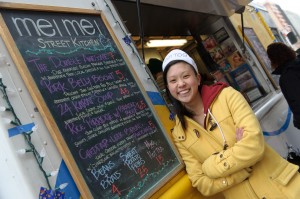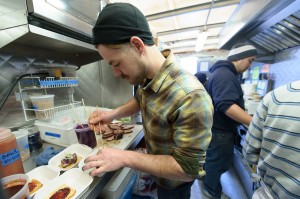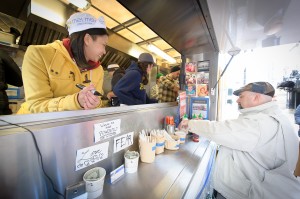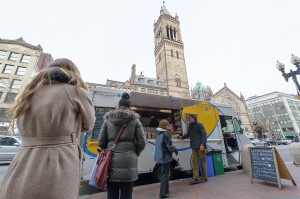
The Mei Mei Street Kitchen food truck is parked next to the Boston Public Library on a freezing December morning. Bundled Bostonians rush down the sidewalk intent on destinations. A few know that inside the truck the proprietors are preparing delicious, warm and comforting food that one wouldn’t expect: velvety carrot soup with bits of feta; pork belly with cranberry hoisin sauce on a soft cream biscuit; cheddar and leek bread pudding. Devoted customers begin to line up, shuffling their feet to keep warm, until the window shutter is raised at 11 a.m.
Irene Li ’08 pops in and out of the truck, enthusiastically greeting “guests,” almost all of whom are regulars. She dispenses cheerful hugs as she asks about jobs, children, pets—knowing all of the customers’ names and favorite menu items. Irene is the face of a sibling business venture that hit the ground last April and has already won a coveted “Best of Boston” award.
 “We think of our work as an experiment, and we try to have as much fun as possible,” says Irene. “We make our food with love. We cook from scratch, taking as few shortcuts as we can bear, and we source our food carefully so that everyone in the equation feels good about what we do. Our guests reap the benefits of eating a diverse and seasonal array of fresh and wholesome products while supporting local farms and businesses.”
“We think of our work as an experiment, and we try to have as much fun as possible,” says Irene. “We make our food with love. We cook from scratch, taking as few shortcuts as we can bear, and we source our food carefully so that everyone in the equation feels good about what we do. Our guests reap the benefits of eating a diverse and seasonal array of fresh and wholesome products while supporting local farms and businesses.”
Irene’s older brother, Andy, spent nearly a decade working in front-of-house management at local fine-dining establishments. Inspired by the food truck movement in other cities, he decided to get in on Boston’s scene early. He asked his two younger sisters to join him. (“Mei Mei” means little sister in Chinese.) Mei, the older of the two, moved back from London, bringing her family, MBA and entrepreneurial background. Irene was a junior at Cornell at the time, but she was willing to come home. Though her academic focus was women’s studies, she was also exploring food and local farming in the Ithaca area with her friend and now business partner, Max Hull.
“We started cooking together my freshman year and making a habit of going to the farmers’ market,” says Irene. “We ran a few small events, like underground restaurant supper clubs, which seem silly looking back, but that was an important experience for us and an opportunity to prepare a lot of food without spending too much money.”
 The siblings’ return to Brookline, Massachusetts, was also personal. The Lis’ father, a former researcher at the Dana-Farber Cancer Institute, had suffered a stroke and was now facing early Alzheimer’s. With her three children back home to help, their mother, a physician at M.I.T., became a champion of the fledging business. (Part of her home stores their supplies, and the Mei Mei Street Kitchen crew butchered their first pig on her kitchen counters.)
The siblings’ return to Brookline, Massachusetts, was also personal. The Lis’ father, a former researcher at the Dana-Farber Cancer Institute, had suffered a stroke and was now facing early Alzheimer’s. With her three children back home to help, their mother, a physician at M.I.T., became a champion of the fledging business. (Part of her home stores their supplies, and the Mei Mei Street Kitchen crew butchered their first pig on her kitchen counters.)
Moving the food truck from idea to execution involved a never-ending to-do list. After incorporating the business, they had to buy a truck, design the interior, and have it retrofitted with kitchen equipment. They had to build an online presence. Endless questions, big and small, demanded answers and decision making. What should they call the business? What permits and inspections did they need? What should they paint on the outside of the truck? What kind of food would they serve? Where would the food come from? Irene says other food trucks were an invaluable resource, particularly in helping the team navigate the city’s bureaucracy.
“We did a lot of brainstorming, and our concept changed many times. It’s still changing,” says Irene.
The early menu consisted of a variety of dumplings. Though labor-intensive to make, they’re a popular Asian food, and the team thought that might be their focus. During the first week of business, however, the Kitchen’s crew quickly realized they couldn’t keep up with the demand.
“Chinese food is a major source of inspiration, but so are our ingredients,” says Irene. “We always want to showcase them in the best way possible.” With this approach, they began to adjust the menu.
 “In the kitchen, creativity is messy,” says Irene. “Our menu develops in many different ways. Sometimes we find a dish we want to make, and we systematically create it from the top down, using a recipe as guidance and providing our own touches. Sometimes we invent things because we need a new item on the fly, or we play around with food combinations we like to eat when making our staff meals. The Double Awesome, our signature sandwich and bestseller, we invented from the leftovers of three other dishes. We put it together because we ran out of prep time. It just sort of happened—a lot of our food is like that.”
“In the kitchen, creativity is messy,” says Irene. “Our menu develops in many different ways. Sometimes we find a dish we want to make, and we systematically create it from the top down, using a recipe as guidance and providing our own touches. Sometimes we invent things because we need a new item on the fly, or we play around with food combinations we like to eat when making our staff meals. The Double Awesome, our signature sandwich and bestseller, we invented from the leftovers of three other dishes. We put it together because we ran out of prep time. It just sort of happened—a lot of our food is like that.”
Their mission to use only locally sourced ingredients also guides the menu. “Our creativity comes out of our limitations, some of which are self-imposed,” says Irene. They make exceptions for a few ingredients, such as garlic, ginger and rice. For acid, they use cranberries or vinegar instead of limes or lemons. They serve soda from Rhode Island. Tofu and cheese comes from Vermont, and pasture-raised beef and pork comes from local farms.
“The kale salad is really popular, and we toyed with the idea of buying kale from California, since we can’t get it locally in December. In the end we decided against it, so it’s off the menu for now,” says Irene. The risk is turning away customers who expect consistency in the offerings.
The business now has nine employees, four of whom are full-time. Andy cooks and runs the kitchen in the truck. Mei handles the business side from home. Irene is on the truck three or four days a week. The other days, she and Max are either in the prep kitchen or driving around picking up ingredients, meeting with farmers and other local vendors.
“We couldn’t do the food sourcing without Irene,” says Max. “Her social skills are amazing. She just has a great way with people.”
 This is evident when you watch her interact with customers and with the crew in the truck. Inside are tight, hot quarters. As orders roll in and the pace picks up, the team is focused, but they are also having a good time. Irene’s whimsical, personal touches are everywhere. A sign over two tip jars asks, “Which is more powerful?” The diners then vote, with their bills and change, between “Love” and “Fear.”
This is evident when you watch her interact with customers and with the crew in the truck. Inside are tight, hot quarters. As orders roll in and the pace picks up, the team is focused, but they are also having a good time. Irene’s whimsical, personal touches are everywhere. A sign over two tip jars asks, “Which is more powerful?” The diners then vote, with their bills and change, between “Love” and “Fear.”
Irene’s social skills carry over to the Internet, where she and her sister maintain a vibrant online outlet for the business using all available avenues: Web site, blog, Facebook and Twitter.
“Twitter is at the center of our business,” says Irene. “It alerts people to our presence. Because we’re a family business, we want our guests to feel like they’re part of our extended family. We want our customers to have some fun and feel connected to the food and the business, so we try to share our personality online.”
Every day they post photos of the chalkboard menu for regulars to check. They post the weekly schedule of where the Mei Mei Street Kitchen will be parked; the truck rotates between three to four spots around the city. In the blog they post favorite recipes and photos from the occasional catering events, such as weddings.
The “Mei Mei” team is already thinking about next steps. They’re exploring a brick-and-mortar restaurant instead of a second truck. What is clear is that Irene and her siblings have the enthusiasm, business acumen and culinary chops to keep on this path of success.
“We’re lucky, in a way, that we have little experience in professional kitchens. It allows us to think like consumers and farmers instead of like chefs,” Irene says. “That’s been the key to our relationship building.”
— Liz Matson



